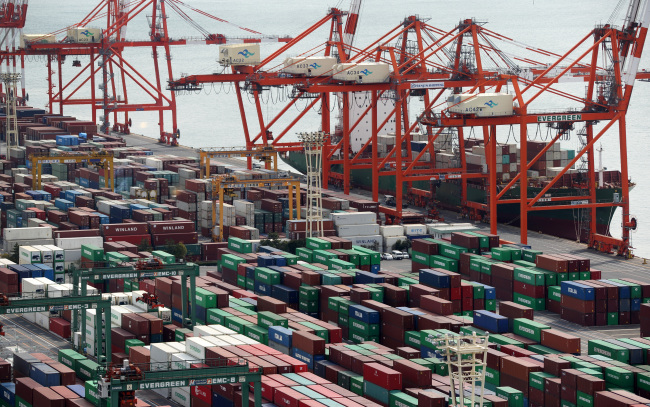Japan’s trade deficit exceeded analysts’ estimates in February, underscoring drags on the nation’s recovery ahead of a sales-tax increase in April that will weigh on domestic demand.
The 800 billion yen ($7.9 billion) shortfall reported by the finance ministry in Tokyo Wednesday was more than the 600 billion yen median estimate in a Bloomberg News survey of 31 economists. Imports expanded 9 percent from a year earlier, and exports rose 9.8 percent.
Sustained trade deficits and limited gains in exports after the yen’s decline make it harder for Prime Minister Shinzo Abe to steer the nation through the economic turbulence that’s likely after the tax increase. Gross domestic product will contract in the coming quarter and the Bank of Japan may be forced to add to stimulus this year, according to Bloomberg News surveys of analysts.
 |
A container ship sits berthed next to gantry cranes at a shipping terminal in Tokyo. (Bloomberg) |
“The trend of a moderate expansion in trade deficits remains intact,” said Long Hanhua Wang, an economist at Royal Bank of Scotland Group Plc in Tokyo. “In the near-term the rise in imports will moderate as the temporary effect fades of imports being pushed higher by demand ahead of the sales-tax increase.”
Imports have exceeded exports for 20 straight months. The yen’s 18 percent slide against the dollar over the past two years has driven up energy import costs as nuclear reactors remain shuttered, while exports have seen limited gains.
“Imports probably will peak around this time due to last-minute demand ahead of the sales-tax increase,” said Takeshi Minami, chief economist in Tokyo at Norinchukin Research Institute Co. “Exports remain weaker than expected.”
Koichi Hamada, 78, an aide to Prime Minister Shinzo Abe, said in a March 14 interview that the central bank should be ready to ramp up stimulus if the 3 percentage-point tax rise seriously damages the economy.
Import volumes fell 0.5 percent from a year earlier, the first decline since September, Wednesday’s report showed. At the same time, inward shipments of motor vehicles rose 81 percent in value with purchases from the European Union jumping 109 percent.
The trade deficit widened to a record in January, boosted by the effects of Asia’s Lunar New Year and the slowdown in U.S. economic activity because of cold weather, Takuji Aida, chief economist at Societe General Securities Ltd. in Tokyo, said in a note. (Bloomberg)








